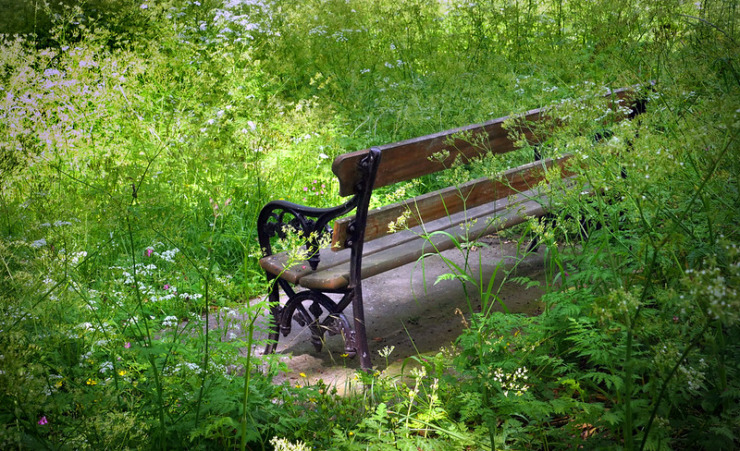Laurie Klein Reads Sonnets 116 and 123
Editor’s Note: “Poems to Listen By” is an audio series where over time we will explore some of the themes in the Poet Laura checklist, as well as Tweetspeak’s “Perspective” theme throughout 2022.
_______
Poems to Listen By: Time Lines—2 Sonnet 116
Presented by Laurie Klein
T.S. Poetry · Sonnet 116 Read By Laurie Klein
Welcome to “Poems to Listen By.” I’m Laurie Klein, and this is our new series: “Time Lines.”
Because our planet’s rotation is incrementally slowing, our days are lengthening. As we turn now to a pair of Shakespeare’s sonnets, the hours before us will outlast those in which he wrote them by 6.8 milliseconds.
“For everything there is a season, and a time for every matter under heaven.” The author who penned those lines from Ecclesiastes went on to say: “A time to keep silence, and a time to speak.”
William Shakespeare, though silenced by death, continues to speak through his writings. Pondering the permanence of love, in our first sonnet today he alludes to the North Star, that celestial guide for a small, storm-tossed ship, in his times known as a “bark.”
CXVI
Let me not to the marriage of true minds
Admit impediments. Love is not love
Which alters when it alteration finds,
Or bends with the remover to remove:
O no; it is an ever-fixed mark,
That looks on tempests, and is never shaken;
It is the star to every wandering bark,
Whose worth’s unknown, although his height be taken,
Love’s not Time’s fool, though rosy lips and cheeks
Within his bending sickle’s compass come;
Love alters not with his brief hours and weeks,
But bears it out even to the edge of doom.
If this be error, and upon me prov’d,
I never writ, nor no man ever lov’d.
—William Shakespeare
Before hearing today’s companion sonnet, take a moment with me to ponder this riddle: I never was, always will be. Unseen, and yet expected everywhere, I offer possibility. Who am I?
If you answered, “Tomorrow,” kudos!
Looking ahead as well as backward in time, the speaker in Sonnet 123 makes a pledge.
CXXIII
No! Time, thou shalt not boast that I do change:
Thy pyramids built up with newer might
To me are nothing novel, nothing strange;
They are but dressings of a former sight.
Our dates are brief, and therefore we admire
What thou dost foist upon us that is old;
And rather make them born to our desire,
Than think that we before have heard them told.
Thy registers and thee I both defy,
Not wondering at the present nor the past;
For thy records and what we see do lie,
Made more or less by thy continual haste:
This I do vow, and this shall ever be,
I will be true, despite thy scythe and thee.
—William Shakespeare
Fellow lovers of poems, let us salute possibility as well as constancy. You’ve just heard sonnets 116, 123, and Ecclesiastes 3:7b. I’m Laurie Klein. Thanks for listening.
Photo by Bernard Spragg. NZ, Creative Commons license via Flickr. Sonnet 116 and Sonnet 123 are in the public domain. Audio and script by Laurie Klein with special thanks to Pat Stien for her participation and years of mentoring. “Simple Gifts” (public domain). Musical performance, recording, and mastering, by Bill Klein.
Browse more Shakespeare sonnets
- Poems to Listen By: Yondering—7: When You Came Back - April 16, 2025
- Poems to Listen By: Yondering—6: Restricted Travel - March 26, 2025
- Poems to Listen By: Yondering—5: Upon Arrival - March 12, 2025


Bethany R. says
Beautiful readings. Always fascinating to hear what you carefully stitch together and share here. Love the musicality in your delivery. And thanks for giving us the heads-up about the meaning of “bark” in sonnet CXVI. 🙂
I have to say, that Shakespeare’s irritation about the “new” old, in Sonnet CXXIII, makes me chuckle. I keep thinking of advertising. “For thy records and what we see do lie,/ Made more or less by thy continual haste[.]” Speaking of constancy and Ecclesiastes, he’s really feeling that notion that, “there is nothing new under the sun.” (Ecc. 1:9b)
I read the riddle to my husband and we enjoyed thinking about it together this morning while making tea. Thanks for this.
Laurie Klein says
Bethany, thank you! I don’t consider myself an expert when it comes to interpreting Shakespeare, but the Bard writes with such intrinsic music the lines (and line breaks) seem to seamlessly call the tongue toward lilt, momentum, and the pregnant pause.
Your comparison to advertising has me grinning. : )
So glad you’re enjoying these recordings, thank you for letting me know!